
A coast guard or coastguard is a maritime security organization of a particular country. The term embraces wide range of responsibilities in different countries, from being a heavily armed military force with customs and security duties to being a volunteer organization tasked with search and rescue without law enforcement authority. In most countries, a typical coast guard's functions are distinct from those of the navy and the transit police, while in certain countries they have similarities to both.

Military police (MP) are law enforcement agencies connected with, or part of, the military of a state. In wartime operations, the military police may support the main fighting force with force protection, convoy security, screening, rear reconnaissance, logistic traffic management, counterinsurgency, and detainee handling.

The Royal Marines Police, or Royal Marines Police Troop is the Royal Marines element of the Royal Navy Police and the military police arm of the Royal Marines. Members of the RM Police enforce service law and discipline.

Law enforcement in Italy is centralized on a national level, carried out by multiple national forces, helped by few limited local agencies. The Italian law enforcement system is considered complex, with multiple police forces and other agencies taking part in different duties. Policing in the Italian system refers to the duties of "full-powered officers" coming from the four national main forces: Polizia di Stato, Carabinieri, Polizia Penitenziaria and Guardia di Finanza. While the duties of these four corps' include investigating and arresting, other local forces carry out limited duties.

A Marine Security Guard (MSG), also known as a Marine Embassy Guard, is a member of the Marine Corps Embassy Security Group, a brigade-sized organization of the United States Marine Corps (USMC) whose detachments provide security at American embassies, consulates, and other official U.S. government offices, such as the United States Mission to NATO in Brussels, Belgium.
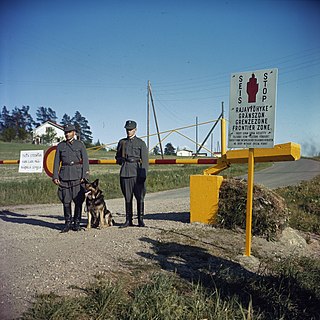
A border guard of a country is a national security agency that ensures border security. Some of the national border guard agencies also perform coast guard and rescue service duties.
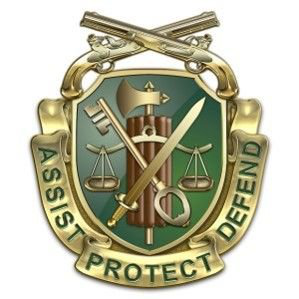
The United States Army Military Police Corps (USAMPC) is the uniformed law enforcement branch of the United States Army. Investigations are conducted by Military Police investigators under the Provost Marshal General's Office or special agents of the Department of the Army Criminal Investigation Division (CID).

Marine Corps Logistics Base Barstow is a United States Marine Corps supply and maintenance installation located in the Mojave Desert east of Barstow, in San Bernardino County, Southern California.

The United States Department of the Army Criminal Investigation Division (CID), previously known as the United States Army Criminal Investigation Command (USACIDC), is the primary federal law enforcement agency of the United States Department of the Army. Its primary function is to investigate felony crimes and serious violations of military law and the United States Code within the US Army. The division is an independent federal law enforcement agency with investigative autonomy; CID special agents, both military and civilian, report through the CID chain of command to the CID Director, who reports directly to the Under Secretary of the Army and the Secretary of the Army. Unlike their counterparts at OSI and NCIS, Army CID does not have primary counterintelligence responsibilities, as this jurisdiction resides with United States Army Counterintelligence Command (ACI)
The structure of the United States Navy consists of four main bodies: the Office of the Secretary of the Navy, the Office of the Chief of Naval Operations, the operating forces, and the Shore Establishment.

Provosts are military police (MP) whose duties are policing solely within the armed forces of a country, as opposed to gendarmerie duties in the civilian population. However, many countries use their gendarmerie for provost duties.
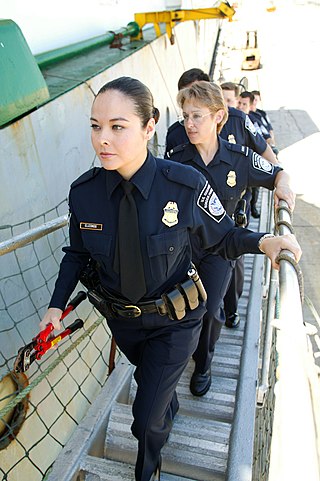
The federal government of the United States empowers a wide range of federal law enforcement agencies to maintain law and public order related to matters affecting the country as a whole.
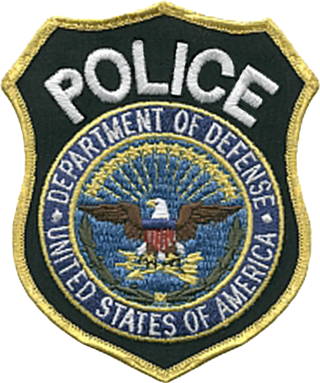
United States Department of Defense police are the uniformed civilian security police officers of the United States Department of Defense (DoD), various branches of the United States Armed Forces, or DoD agencies.

The United States Marine Corps Criminal Investigation Division is a federal law enforcement agency that investigates crimes against people and property within the United States Marine Corps.

The Department of the Army Civilian Police (DACP), also known as the Department of the Army Police, is the uniformed, civilian-staffed security police program of the United States Army. It provides professional, civilian, federal police officers to serve and protect U.S. Army personnel, properties, and installations. DACP personnel represent the Department of the Army's contribution to the Department of Defense Police program. DACP law enforcement officers primarily work alongside the U.S. Army Military Police Corps, the Army service members who hold law enforcement military occupational specialities. DACP officers are supplemented by Department of the Army Security Guards, who are uniformed and armed federal security officers, primarily responsible for entry control and basic security tasks. Although the Army Criminal Investigation Division employs civilian special agents, it does not fall-under the DACP nor DoD Police umbrella.
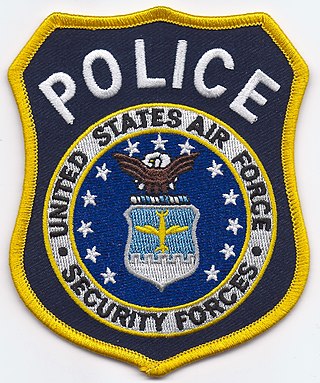
The United States Department of the Air Force Police is the uniformed security police program of the Department of the Air Force (DAF). It provides professional, civilian, federal police officers to serve and protect U.S. Air Force (USAF) and Space Force (USSF) personnel, properties, and installations. DAF Police personnel represent the DAF's contribution to the Department of Defense Police program. DAF Police officers primarily work alongside USAF Security Forces, the military police of the USAF and USSF. Although a separate branch from the USAF, the USSF still falls-under the DAF, therefore law enforcement services are provided to the USSF by the DAF Police and USAF Security Forces. Although the Air Force Office of Special Investigations employs civilian special agents, it does not fall-under either the DAF Police or DoD Police umbrella.

The United States Coast Guard Police (CGPD) are law enforcement units stationed at certain shore facilities of the United States Coast Guard.

The Master-at-Arms (MA) rating is responsible for law enforcement and force protection in the United States Navy—equivalent to the United States Army Military Police, the United States Marine Corps Military Police, the United States Air Force Security Forces, and the United States Coast Guard's Maritime Law Enforcement Specialist. It is one of the oldest ratings in the United States Navy, having been recognized since the inception of the U.S. Navy.
The United States Department of the Navy Police is the uniformed security police program of the United States Navy. It provides professional, civilian, federal police officers to serve and protect U.S. Navy personnel, properties, and installations. DoN Police personnel represent the Department of the Navy's contribution to the Department of Defense Police program. DoN Police officers primarily work alongside U.S. Navy masters-at-arms, the military police of the U.S. Navy. Although under the Department of the Navy, the United States Marine Corps (USMC) maintains its own civilian law enforcement program for Marine Corps-centric installations, the USMC Civilian Police. Despite both employing civilian special agents, neither the Naval Criminal Investigative Service nor the USMC Criminal Investigation Division fall-under the auspices of the DoN/DoD Police; both agencies have their own chains of command.
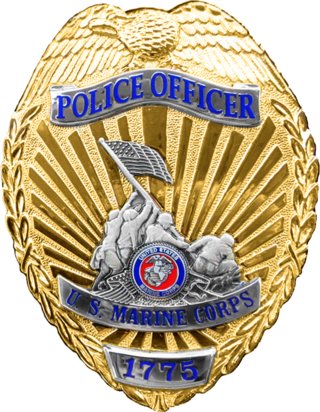
The United States Marine Corps Military Police is the uniformed law enforcement branch of the United States Marine Corps.




















